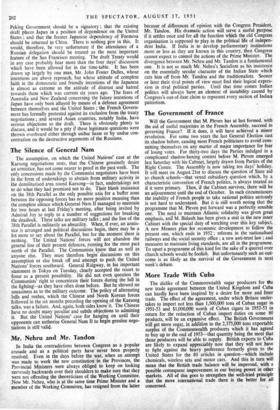The Government of France
Will the Government that M. Pleven has at last formed, with the aid of useful majorities in the French Assembly, succeed in governing France? If it does, it will have achieved a minor revolution. For some two years the last General Election cast its shadow before, causing most French politicians to avoid com- mitting themselves on any matter of major importance for fear of losing votes. For thirty-two days the Parties indulged in a complicated shadow-boxing contest before M. Pleven emerged last Saturday with his Cabinet, largely drawn from Parties of the Right Centre. The Assembly is. now taking ten days' holiday. It will meet on August 21st to discuss the question of State aid to church schools—that vexed subsidiary question which, by a characteristic convention of French politics, is always treated as if it were primary. Then, if the Cabinet survives, there will be an adjournment until the end of October. In such circumstances the inability of French people to take national politics seriously is not hard to understand. But it is still worth noting that the programme that M. Pleven put forward was a perfectly sensible one. The need to maintain Atlantic solidarity was given great emphasis, ana M. Bidault has been given a seat in the new inner Cabinet with the special duty of watching over this key subject_ A new Monnet plan 'for economic development to follow the present one, which ends in 1952 ; reforms in the nationalised railways and the social security office ; a new anti-trust law ; and measures to maintain living standards, are all in the programme. To upset a programme of this kind for the sake of a quarrel over church schools would be foolish. But unfortunately such an out- come is as likely as the survival of the Government in next week's debate.






























 Previous page
Previous page